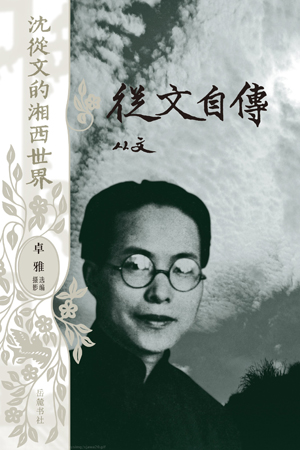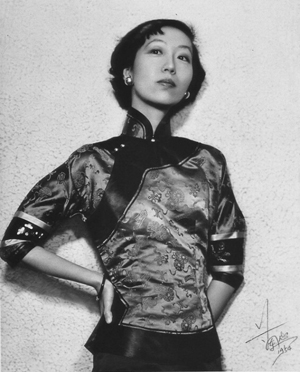Written by: Yao Dan
Posted on: July 02, 2015 | 
Fenghuang County, Hunan, the birthplace of Shen Congwen

The most important writer of the "Beijing School" is Shen Congwen (1902-1988), formerly known as ShenYuehuan. He was born into a prestigious military man's family in Fenghuang County, Hunan. Fenghuang County is located at the intersection of Hunan, Sichuan and Guizhou provinces in Yuanshui River drainage area, where the Dong, Miao and Tujia ethnic groups live. Upon graduation from primary school, Shen Congwen joined the local army and moved around the Yuanshui River drainage area with the army unit. During this period, he got acquainted with the life and local conditions of this multiethnic region, and accumulated a lot of experience and source materials for literary creation. While he made a name for himself, Shen Congwen still clung to his "countryman" identity, and continued to create lots of unique literary works from the perspective of a "countryman." His major works include novels and novellas, Longzhu, Border Town, Long River, collections of short stories, Fringed with Flowers, Eight Running Horses, The Old and the New, Housewives, The Spring Lantern, and collections of prose writings, A Biography of Shen Congwen, Random Notes from Hunan, and Western Hunan.
A Remote Town is Shen Congwen's most important work. In this novella, he creates an ideal countryside by the name of Western Hunan. The story is set against a small border town called Chadong in Western Hunan. Cuicui, the heroine of the story, lives an Arcadian life in Chadong with her grandfather, an old boatman. Shunshun, the owner of the boats, has two sons, Tianbao and Nuosong, who both fall in love with Cuicui. But Cuicui loves Nuosong. In order to help his younger brother and Cuicui realize their wish, Tianbao sails away from home alone to make a living, but dies in an accident. After losing his brother, Nuosong is tormented with self-reproach and guilt, and finally leaves Cuicui and the small town. Before long, the old boatman dies a sudden death. Cuicui is left alone and starts her endless waiting for the return of Nuosong. Nuosong "probably will never return, or he will be back tomorrow." The story comes to an abrupt end with Cuicui's waiting. This is a tragic love story. Cuicui, Tianbao and Nuosong are faultless, but they are fooled by fate that is beyond their control. The story presents a tragic color of ancient Greek tragedies, but the love tragedy of Cuicui is not what Shen Congwen is primarily concerned about. What he praises through this tragic love story is the beautiful nature of the people living in this Arcadian Western Hunan. Though shining brightly with the radiance of the divine, she pursues a form of life that is "graceful, healthy and natural, and does not go against humanity." Shen Congwen's purpose of exploring human nature and the form of life in this age-old Western Hunan is, by looking back into China's traditional countryside, to look for an inner strength that can activate our old nation.

Standing opposite the "Beijing School", Zhang Ailing was the most important representative of the "Shanghai School". Zhang Ailing (1921-1995), formerly known as Zhang Ying, was born in an old and renowned family in Shanghai, and was well versed in traditional Chinese culture. In 1939, she received the letter of admission from London University. However, she didn’t go because of the warfare. Instead, she went to Hong Kong University. At the outbreak of the Pacific War in 1942, she returned to Shanghai from Hong Kong and started professional writing. Her major works include Predestined Half a Lifetime Reunion, a collection of novellas and short stories, legends and novels, Zhang Kan, a collection of prose writings and stories, and Gossip, a collection of prose writings, etc.
Contrary to Shen Congwen, who had his eyes on China's rural areas, Zhang Ailing focused on modern urban civilization in her writings from beginning to end. All her stories are set against the backdrop of Hong Kong and Shanghai, where millions of men and women, in an age of transition from the old to the new, lead a life that is half Chinese and half Western in form and style. The main content of Zhang Ailing's works is about the gloomy life of the urban people, and the actual situation and mental state of the women who are living from traditional old families in modern society are the focus of her attention. The Story of the Gold Fetters (included in Legends in 1943), is one of Zhang Ailing's major works, which tells the story of Cao Qiqiao, a widow from an old feudal family. Cao Qiqiao, the daughter of a sesame oil mill owner, is married into the rich Jiang family as the concubine of the second young master. The second young master of the Jiang family dies of bone tuberculosis after giving Cao Qiqiao a son and a daughter. Cao Qiqiao is a woman of low birth, jeered and rejected by the Jiang family. Moreover, her marriage with the second young master is actually more in name only. Cao Qiqiao, becoming very much depressed, develops an ambiguous and subtle relationship with the third young master of the Jiang family. But the third young master finally walks out on her because of his fears of feudal ethic codes, and their relationship comes to a fruitless end. This turns this feeble woman into a frantic monster. Cao Qiqiao tries every means to seize all that is to her name, including her money and children, finally leading to the death of her daughter-in-law and the breaking up of her daughter's marriage. By the time she gets her children to her hoops, they have become drug addicts. The more Cao Qiqiao tries to grab something by hook or by crook, the farther it goes beyond her reach. Like a beast in an iron cage, she fights fiercely amid the desire with the gold chain tied up tightly around her, "the angles of the heavy fetters have cut several people into half, and those who are still alive have lost half-life." The absurdity and bleakness of life is vividly depicted through the story of Cao Qiqiao.
You may also like: